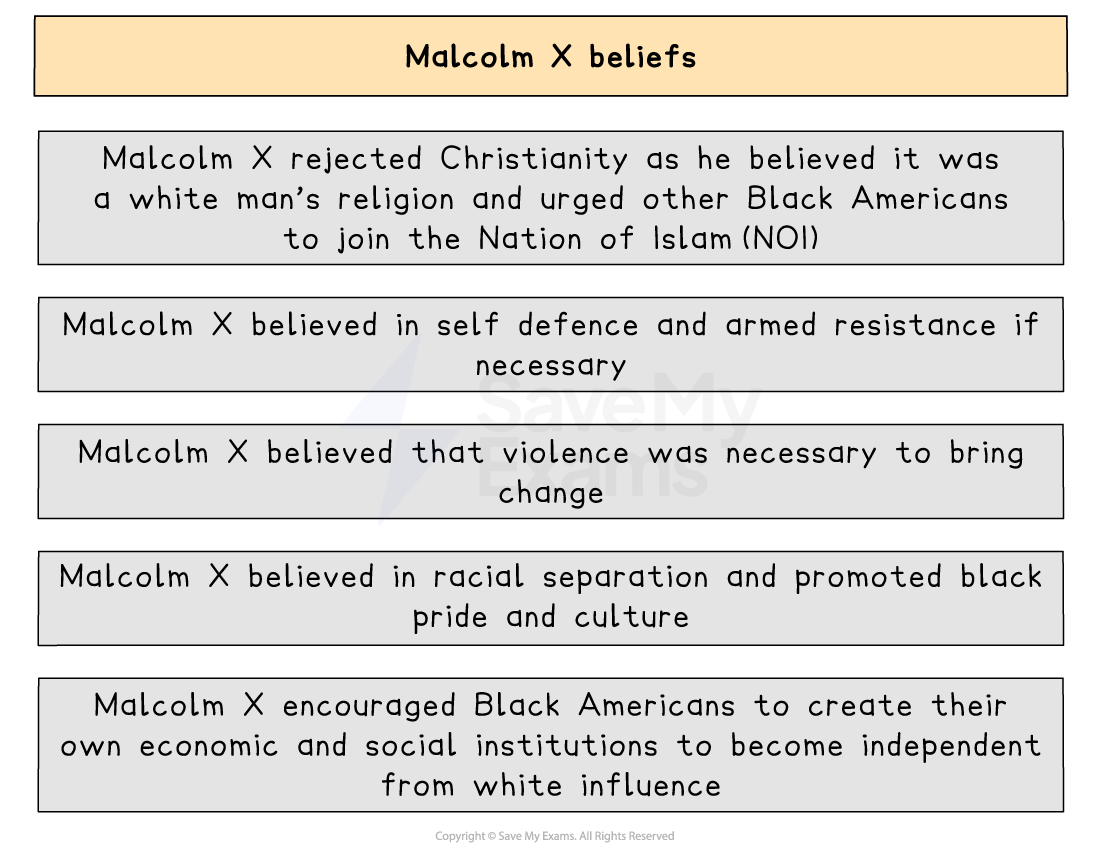Malcom X (Edexcel GCSE History): Revision Note
Exam code: 1HI0
Summary
Malcolm X emerged from a troubled start in life to become one of the most influential, inspirational and controversial leaders of the Civil Rights movement. He rejected the calls of Martin Luther King and other civil rights leaders for peaceful direct action and took a more confrontational approach. Malcolm X was a member of the Black nationalist religious organisation known as the Nation of Islam (NOI). He argued that Black Americans should defend themselves ‘by any means necessary’. As Malcolm became more popular, membership of the NOI soared. But Malcolm’s disagreements with its leaders were to have terrible consequences and led to his murder at the hands of NOI members in 1964.
Who was Malcolm X?
Malcolm X was an important Civil Rights campaigner who rejected the non-violent approach adopted by Martin Luther King and his supporters

Early Life
Born Malcolm Little in Omaha, Nebraska 1925
Malcolm had a troubled childhood:
When he was six, his father was killed, possibly by White racists
Soon after, his mother was committed to a psychiatric hospital
Malcolm was placed in foster care and, at the age of 2, was sentenced to 8 -10 years in prison for robbery
After Prison
Malcolm joined the Nation Of Islam (NOI), a militant Black nationalist organisation, whilst in prison and became one of its most prominent members after his release
It was then that he rejected his surname due to its slaveowner origins
Instead, he adopted the letter X as his surname - which is used in mathematics to represent an unknown quantity
This made the point that his African surname had been ‘lost’ when his ancestors had been enslaved and given the name of their slave master
Malcolm X’s beliefs
Malcolm X had many strong beliefs, some of which changed throughout his life
As he rose to national and international fame, he became renowned for arguing for:
Racial separation
Promotion of Black pride and culture
Rejecting non-violent direct action
Using armed resistance when necessary

Impact of Malcolm X
Malcolm X was a fiercely intelligent and highly effective public speaker
He was very charismatic and confrontational
His ability to inspire and educate led to the NOI membership expanding to over 100,000 by 1963
Many people believe his popularity directly led to the formation of the Black Power movement
His approach also attracted a great deal of opposition and claims that he encouraged violence and hatred
He had called on Black people to defend themselves by ‘by any means necessary’ and described White people as ‘collectively’ evil in a TV interview
Malcolm X after leaving NOI and his Pilgrimage to Mecca
Malcolm left the NOI in 1964 after falling out with its leader, Elijah Muhammad
He then travelled to Mecca and was profoundly affected by the shared experience with Muslims of different nationalities and skin colours
It caused him to reject his old beliefs about racial separation
He decided to enable cooperation between the Civil Rights groups by:
Setting up the Organisation of Afro-American Unity (OAAU)
Founding a religious group called Muslim Mosque Inc
He met with the Congress of Racial Equality (CORE) and the Student Nonviolent Coordinating Committee (SNCC) leaders to find a way of working together to advance the civil rights cause
Impact of Malcolm X’s Assassination
Any plans Malcolm may have had for increased cooperation were ended when he was shot 15 times by a NOI assassin
He had previously survived his home being firebombed by members of the NOI
Over 15,000 people attended his funeral on 27 February 1965
His ideas and principles were to serve as an inspiration and example to a new group of radical civil rights campaigners known as the Black Power movement

Examiner Tips and Tricks
In question 4 on this paper, you will be asked how far you agree with an interpretation of a certain point. Remember, you have to provide evidence or an explanation that supports, evidence or an explanation that disagrees with it and a reasoned judgement in your conclusion.

Unlock more, it's free!
Was this revision note helpful?
